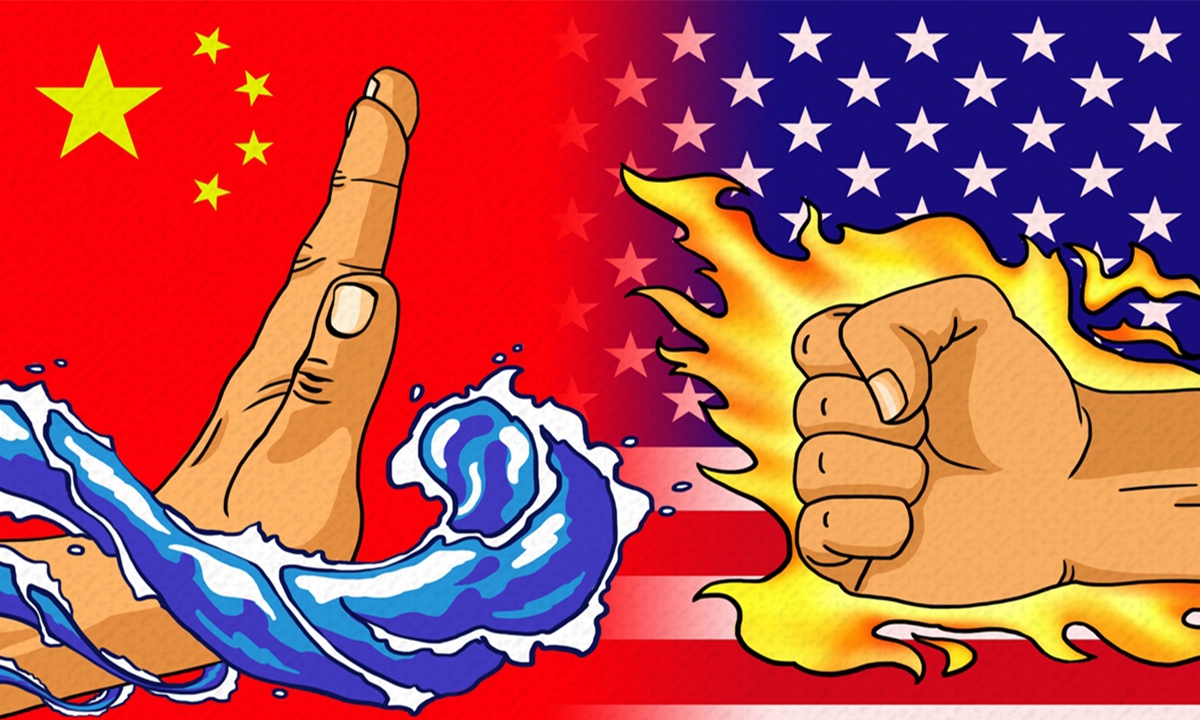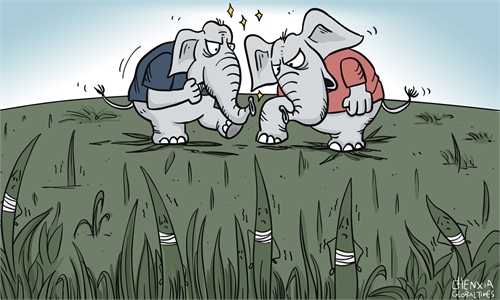
Illustration: Liu Rui/GT
Recently, the Vice Chairman of the US Joint Chiefs of Staff, General John E. Hyten stated, "Our goal should be to never go to war with China, to never go to war with Russia, because that day is a horrible day for the planet, a horrible day for our countries." His concern was echoed by retired Admiral Harry B. Harris, Jr., a former Commander of the US Pacific Command. Harris emphasized that the US must do everything it can to prevent open warfare with China.With respect to the US and China, General Hyten also observed that a destructive pattern in history known as the Thucydides' Trap could be repeated. As defined by historian Graham Allison the Thucydides' Trap refers to the natural, inevitable discombobulation that occurs when a rising power threatens to displace a ruling power, the resulting structural stress makes a violent clash the rule, not the exception.
General Hyten stated that while the US and Russia have a better mutual understanding due to routine Cold War dialogue, such rational and candid communication does not exist between the US and China. Given the catastrophic global consequences of war, why are our nations unable to look inward and to each other to revisit what have evolved into hostile policies towards each other? The answer is groupthink.
Groupthink occurs when a collection or committee of people value harmony and conformity more than discords, even though rational research, analysis and decision-making are overruled. A dominant narrative embodied by a charismatic, predisposed leader normally seeds groupthink consensus which reactively suppresses or dismisses contrarian viewpoints. So, what are the likely US and China narratives?
Since the 1949 founding of the People's Republic of China, US China-averse hawks have seeded a China hate groupthink. This has infected the US government and public. The US narrative states that China cannot be trusted because it is an evil communist dictatorship that crushes the human rights of its citizens and has imperial designs to rule the world.
A China narrative also might state that the US can never be trusted because it abandoned the Three Joint Communiqués, with the Taiwan Relations Act, as a US ploy to contain China and use Taiwan as an imperial stepping stone toward regime change in China.
In the absence of a rational dialogue that mitigates misunderstandings, distrust will grow. This will further fuel suspicions and an arms race that could very well end in General Hyten's forecast of apocalyptic global consequences from a war that must never happen.
Interestingly, in his book titled Destined for War: Can America and China Escape Thucydides's Trap?, Graham Allison observes, in four of the 16 [elucidated] cases… imaginative statecraft averted war. Statecraft is diplomacy, and diplomacy is acts of spoken or written speech intended to influence events in the international system, or simply said, it is rational and candid communications.
Western and Eastern traditions of effective interstate communications differ greatly and can be initially problematic. When one speaks of being lost in translation, the other one imagines language translations. However, the pronounced gap in understanding between US and Chinese priorities is also a failed cultural translation.
At one time, an understanding gap existed between the US and the Soviet Union, but the frequency and substance of communications throughout the Cold War bridged otherwise dangerously faulty calculations. Because of that continuous diplomatic dialogue and military-to-military engagement, and to the benefit of the world, nuclear war was averted more than once in the 20th Century.
Ethnic Chinese and Russian cultures have shared the Asian continent side-by-side for thousands of years. They have become reliable friends because of uninterrupted engagement at all levels of government and society. When differences arise, they are dealt with rationally, not emotionally. Why? Because they truly understand one another.
Even if it never comes to compare to a friendship due to differing cultural and ideological characteristics, it is precisely that depth of continuous diplomatic dialogue and military-to-military engagement which is urgently required between the US and China.
Both General Hyten and Allison have made clear that falling into the Thucydides' Trap is not an inevitability in the case of the US and China - so long as we learn from history and apply best practices to the present. If we want to avert what would certainly escalate into WWIII to the eternal regret of all, we must follow General Hyten's advice and speak with each other.
The author is a retired Marine Corps infantry officer who now serves as a US civil servant in the Pentagon. Opinions are of the author and do not represent the US government. opinion@globaltimes.com.cn



